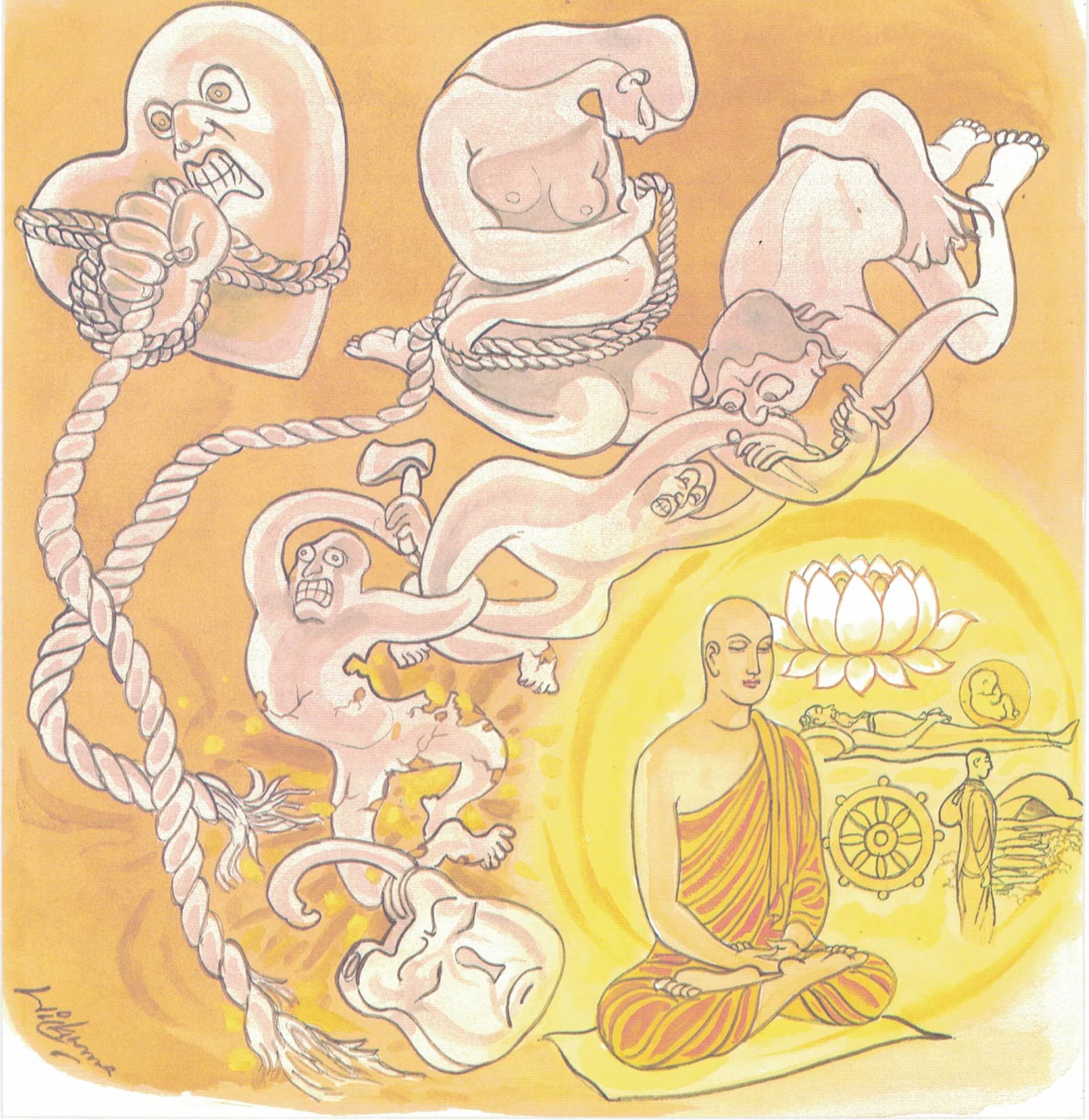Dhammapada (Illustrated)
by Ven. Weagoda Sarada Maha Thero | 1993 | 341,201 words | ISBN-10: 9810049382 | ISBN-13: 9789810049386
This page describes The Story of a Tug of War which is verse 398 of the English translation of the Dhammapada which forms a part of the Sutta Pitaka of the Buddhist canon of literature. Presenting the fundamental basics of the Buddhist way of life, the Dhammapada is a collection of 423 stanzas. This verse 398 is part of the Brāhmaṇa Vagga (The Brāhmaṇa) and the moral of the story is “All trappings discarded, cross-bar barrier lifted up, that enlightened one I call a true brahmin”.
Verse 398 - The Story of a Tug of War
Pali text, illustration and English translation of Dhammapada verse 398:
chetvā naddhiṃ varattaṃ ca sandāmaṃ sahanukkamaṃ |
ukkhittapalighaṃ buddhaṃ tamahaṃ brūmi brāhmaṇaṃ || 398 ||
398. When cutting strap and reins, the rope and bridle too, tipping the shaft, he’s Waked, that one I call a Brahmin True.
 All trappings discarded, cross-bar barrier lifted up, that enlightened one I call a true brahmin. |
The Story of a Tug of War
This religious instruction was given by the Buddha while he was in residence at Jetavana with reference to two brāhmins.
The story goes that one of these two Brāhmins had an ox named Little Red, Culla Rohita, and the other had an ox named Big Red, Mahā Rohita. One day they fell to arguing about the comparative strength of their respective oxen, saying, “My ox is the strong one! my ox is the strong one! “When they were tired of arguing, they said, “What is the use of our arguing about it? We can find out by driving the two oxen.” Accordingly they went to the bank of the river Aciravati, loaded their cart with sand, and yoked up their oxen. At that moment some monks came to the bank of the river for the purpose of bathing. The Brāhmins whipped up their oxen, but the cart stirred not an inch. Suddenly the straps and the thongs broke. The Monks saw the whole proceeding, and when they returned to the monastery, told the Buddha all about it. Said the Buddha, “Monks, those are the external straps and thongs, which whoso may cut. But a monk must cut the internal strap of anger and the thong of Craving.” So saying, he pronounced the following Stanza.
Explanatory Translation (Verse 398)
nandhiṃ varattaṃ sahanukkamaṃ sandāmaṃ chetvā
ukkhittapaḷighaṃ buddhaṃ taṃ ahaṃ brāhmanaṃ brūmi
nandhiṃ [nandhi]: the strap of hatred; varattaṃ [varatta]: the thong of craving; sahanukkamaṃ sandāmaṃ [sandāma]: the major shackle along with its links; chetvā: having several; ukkhittapaḷighaṃ [ukkhittapaḷigha]: lifted the cross-bar; buddhaṃ [buddha]: become aware of reality; taṃ: that person; ahaṃ: I; brāhmanaṃ brūmi: described as the brāhmaṇa
He has got rid of the strap of ill-will. He has freed himself from the thong of craving. He has escaped the large shackle breaking all its links. These are the false views that curb the people. He has taken off the crossbar of ignorance. He has become aware of the four noble truths. That person, I describe as a brāhmaṇa.
Commentary and exegetical material (Verse 398)
In this verse the seeker after truth is compared to a person who tends an ox and a cart.
nandhiṃ: strap in the cart analogy. In the quest for spiritual liberation it is that which ties and binds a person.
varattaṃ: thong in the analogy of the cart and ox. It is craving in the spiritual quest as it entraps.
sandāmaṃ sahanukkamaṃ: In the analogy of the cart and ox, these expressions refer to cord together with the bridle. In the spiritual quest, these represent the sixty-two wrong views.
Buddha’s attitude to what He hears: This verse, and many others, came to be spoken with regard to events the Buddha was informed of. In the Buddha’s method of communication He makes use of any event of incident that is likely to profit the listeners.
One day, as the Buddha entered Sāvatthi for alms, He saw some children catching fish and killing them in a dried up reservoir, not far from the Jetavana Monastery. The Buddha went up to the children and asked, “Children, do you fear suffering, and do you dislike suffering?” “Yes, Venerable, we fear suffering, and we dislike suffering,” said the children. The Buddha said, “If you fear and dislike suffering, do not do any evil act, whether in the open or in secrecy. If you do an evil act now, or in the future, you will have no escape from suffering, even if you try to run away from it.”
